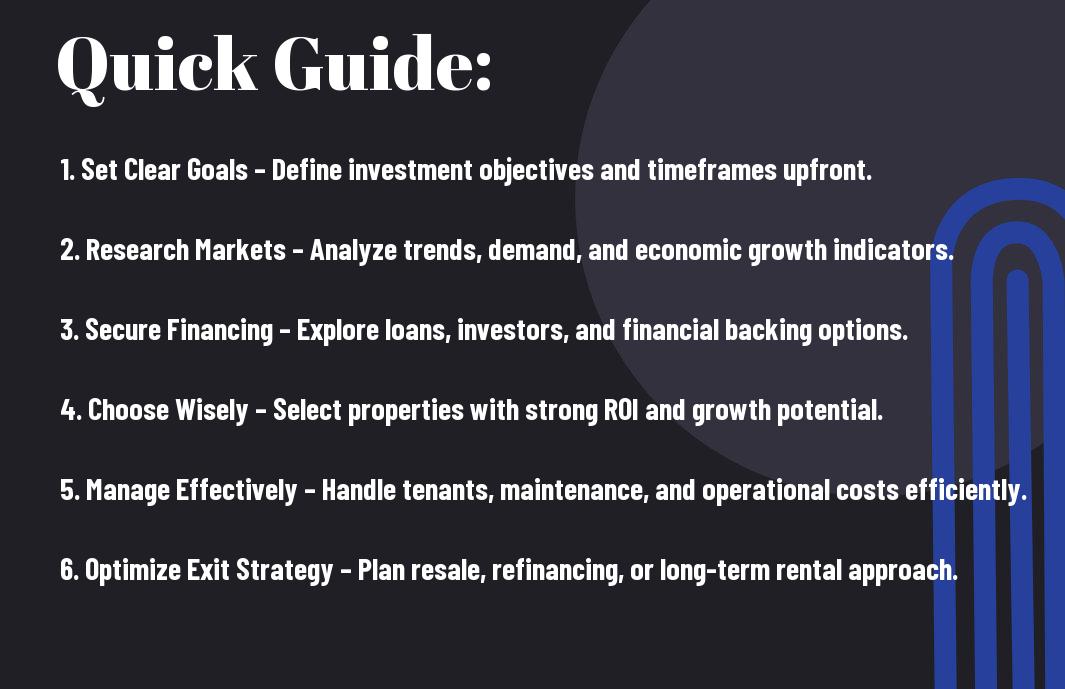Strategies for successful real estate investing can seem overwhelming, but with the right guidance, you can navigate this rewarding field with confidence. In this blog post, you will discover practical how-to approaches that will help you make informed decisions, build a strong portfolio, and maximize your returns. Whether you are a seasoned investor or just starting out, these actionable steps will equip you with the knowledge and tools necessary for success in the real estate market.

Types of Real Estate Investments
While exploring the various avenues of real estate investing, it is vital to understand the different types of investments available. Each category comes with its own set of risks, rewards, and management requirements. By being clear about your goals and risk tolerance, you can select the investment type that aligns with your strategy. Here’s a concise breakdown of the most common types:
| Type | Characteristics |
|---|---|
| Residential Properties | Single-family homes, multi-family units, and rental properties. |
| Commercial Properties | Office buildings, retail spaces, and warehouses. |
| Industrial Properties | Properties used for manufacturing, storage, and distribution. |
| Real Estate Investment Trusts (REITs) | Companies that own, operate, or finance income-generating properties. |
| Land Investment | Raw land, agricultural lands, or lot investments. |
Assume that you are considering your first steps into real estate investing. In that case, it’s vital to evaluate these types and gauge your interest, financial capacity, and market understanding to make informed decisions.
Residential Properties
One of the most popular avenues for new investors is residential properties. These include single-family homes, condominiums, duplexes, and multi-family units. The appeal of this market lies in the relatively high demand for housing as people are continually in search of places to live. By investing in residential properties, you can generate rental income or take advantage of property appreciation over time, making it a potentially lucrative investment choice.
One effective strategy in this space is house hacking, where you purchase a home, live in one part, and rent out the other. This approach allows you to offset your mortgage payment and can provide you with firsthand experience in managing tenants and properties, serving as an excellent starting point in your investment journey.
Commercial Properties
Little has a more substantial potential for income than investing in commercial properties. These properties include office buildings, retail storefronts, warehouses, and industrial facilities. Commercial investments tend to have longer lease terms compared to residential properties, which can often result in more consistent cash flow. Moreover, businesses often renew their leases, providing a stable revenue stream for investors.
Plus, commercial properties often provide higher returns on investment due to the increased rental income and property appreciation. With proper due diligence, you can capitalize on economic growth, tenant demand, and location advantages. These factors can significantly influence the value of your commercial property and your overall success as a real estate investor.
Key Factors to Consider
Assuming you are commenceing on your journey into real estate investing, it is vital to keep certain key factors in mind that can significantly impact your success. Here are some elements you should consider:
- Your investment goals and strategies
- The financial aspects, including budget and financing options
- Market conditions and trends
- The specific type of property and its potential for appreciation
- Location and demand for rental properties
Your understanding of these factors will shape your decisions and guide you in making informed choices throughout your investment process. Thou shall not overlook the significance of thorough research and strategic planning.
Market Trends
With the real estate landscape constantly shifting, staying updated on current market trends is indispensable for a successful investment strategy. This involves analyzing economic indicators such as employment rates, housing inventory, and property prices to gauge the investment climate. Understanding these trends allows you to identify the best times to buy or sell, ultimately enhancing your profitability.
Additionally, becoming familiar with the local market nuances can help you identify emerging neighborhoods or areas in decline. Armed with this knowledge, you can make strategic decisions that align with broader market movements, ensuring your investments not only remain relevant but also attractive to potential buyers or renters. Always keep an eye out for fluctuations that could affect your portfolio.
Location Analysis
Assuming you have recognized the importance of market trends, moving on to location analysis takes your strategy a step further. The location of your investment not only influences property value but also plays a significant role in rental demand and tenant satisfaction. When analyzing location, consider factors such as proximity to schools, public transportation, and local amenities. Areas with strong community ties and good schools often attract higher rental prices and more stable tenants.
Plus, it’s important to evaluate the long-term potential of the neighborhood. Look beyond the current state of the property market by researching planned developments, infrastructure improvements, and zoning changes that may affect the area’s desirability. Investigating these aspects provides a more extensive view of potential growth and enhances your decision-making process, ensuring that you make enlightened choices in your property investments.
Step-by-Step Guide to Getting Started
Many individuals find the process of starting their real estate investment journey overwhelming, but breaking it down into manageable steps can simplify the process. By following a structured approach, you can navigate the complexities of the real estate market with greater ease and confidence. The first step is to set clear goals and establish a budget that aligns with your financial situation and aspirations. This will provide you with a solid foundation as you begin your investment journey.
Table: Steps to Get Started
| Step | Description |
| 1 | Set Your Investment Goals |
| 2 | Establish a Budget |
| 3 | Research Potential Markets |
| 4 | Evaluate Properties |
| 5 | Make an Offer |
Setting Goals and Budget
Now is the time to clarify your investment goals and financial framework. Start by asking yourself what you want to achieve through real estate investing. Are you looking for long-term appreciation, rental income, or perhaps even a mix of both? Once you have defined your objectives, it’s crucial to establish a budget. Analyze your finances to determine how much you can afford to invest, keeping in mind any additional costs associated with buying and maintaining a property.
Establishing a budget not only helps you set realistic expectations but also protects you from potential financial pitfalls. Consider factors such as your income, expenses, and any existing debt to gauge how much you can allocate for your investments without compromising your financial health. This proactive approach allows you to make informed choices that align with both your immediate and long-term goals.
Researching and Evaluating Properties
There’s a world of opportunity out there, but sifting through it all requires diligent research and critical evaluation of potential properties. Start by identifying markets that align with your investment goals. Look for neighborhoods with potential for growth, strong rental demand, and affordability. Utilize online resources, real estate market reports, and local listings to gather pertinent data about different areas.
Evaluating properties is a multi-faceted process that involves assessing physical attributes, location, and market conditions. Pay attention to factors like property value trends, rental yields, and the condition of the building. It’s also wise to visit potential properties in person, as this can give you a better sense of the neighborhood and the state of the property itself. By conducting thorough research and evaluations, you position yourself to make informed and strategic investment decisions that align with your goals.
Essential Tips for Success
Your journey in real estate investing can be rewarding, but to pave the way towards long-term success, there are some vital tips you should consider. One of the most important aspects of successful real estate investing is having a solid plan that includes clear goals and strategies for achieving them. You should also conduct thorough market research, evaluate properties diligently, and understand the financial implications of each investment. Here’s a quick checklist to guide you:
- Set clear, achievable goals.
- Conduct extensive market research.
- Understand financing options and implications.
- Network with other investors and real estate professionals.
- Stay organized and maintain detailed records.
Knowing how to blend these elements together can greatly enhance your chances of success in the ever-evolving real estate market.
Networking and Building Relationships
Little did you know that one of the most powerful tools at your disposal is your network. Building relationships within the real estate industry can open doors to opportunities you may not otherwise encounter. Whether it’s connecting with other seasoned investors, real estate agents, contractors, or property managers, these relationships can provide you with insider knowledge, potential partnerships, and even leads on properties before they hit the market. Attend local real estate meetings, join investment clubs, and utilize social media to actively engage with your network.
Moreover, nurturing these connections goes beyond just exchanging business cards. Offering your expertise or assistance to fellow investors can create mutual benefits and strengthen those alliances. You will often find that the support and advice from seasoned professionals can save you time and resources in decision-making. Through consistent engagement and building trust within your network, you position yourself to capitalize on opportunities as they arise.
Continuous Learning and Adaptation
On your path as a real estate investor, continuous learning and adaptation are key components to thriving in the market. The real estate landscape is ever-changing, influenced by economic trends, regulatory changes, and market demands. To remain competitive, you must stay informed about the latest industry news, market analysis, and investment strategies. This could involve attending workshops, enrolling in courses, following real estate blogs, or simply reading books authored by successful investors.
Essentially, by committing to ongoing education, you’re equipping yourself with the necessary tools to make informed decisions and pivot when needed. Keeping a finger on the pulse of market trends allows you to anticipate changes and adjust your investment strategy accordingly. In the dynamic realm of real estate, the most successful investors are those who are adept at adapting their tactics and approaches as the market evolves, setting themselves apart in a competitive environment.
Pros and Cons of Real Estate Investing
Keep in mind that like any investment vehicle, real estate comes with its own set of advantages and disadvantages. Understanding these pros and cons can help you make informed decisions as you venture into the property market. Here’s a breakdown of the key factors to consider:
| Pros | Cons |
|---|---|
| Potential for steady income through rental properties | High upfront costs for purchasing properties |
| Appreciation of property value over time | Market fluctuations can affect property value |
| Tax benefits, including deductions for mortgage interest | Property management can be time-consuming |
| Diverse investment options, such as residential and commercial | Risks associated with tenants and lease agreements |
| Ability to leverage your investment through financing | Maintenance and unexpected repair costs |
Advantages of Investing in Real Estate
You will find that one of the primary advantages of investing in real estate is the potential for consistent cash flow through rental payments. Properties that generate reliable income can provide you with a steady financial return while also allowing you to build equity over time. Furthermore, real estate often appreciates in value, which enhances your overall investment portfolio. With the right property and effective management, you can enjoy both short-term and long-term financial benefits.
You may also appreciate the tax advantages associated with property ownership. Deductions on mortgage interest and property taxes can substantially lower your tax liability, ultimately increasing your net income. Additionally, real estate can serve as a hedge against inflation since property values and rental income typically rise during economic growth periods.
Potential Drawbacks and Risks
One critical aspect to consider is the risks and drawbacks that come with real estate investing. You should be aware that purchasing property requires significant capital, and financing options often include high-interest rates and lengthy commitments. This financial burden can be challenging, especially if your property does not generate income as expected.
Real estate markets can also be unpredictable, leading to potential loss of property value during economic downturns. Factors such as natural disasters, faulty tenants, and legislative changes can impact your investment profitability. Additionally, the costs associated with property management, such as maintenance and repairs, can add up quickly, potentially eating into your profits. Understanding these pitfalls will better prepare you to navigate the real estate landscape effectively.
Effective Strategies for Management and Growth
For effective management and growth of your real estate investments, establishing robust property management techniques is important. You should consider hiring professional property management services that can handle day-to-day operations, tenant relations, and maintenance issues. This allows you to focus on your broader investment strategy while ensuring that your properties are well-maintained and profitable. Additionally, utilizing property management software can streamline processes such as rent collection, lease tracking, and maintenance requests, saving you time and reducing the potential for human error.
Property Management Techniques
Management of your properties extends beyond simply collecting rent. Regularly scheduled maintenance checks and prompt response to tenant concerns foster positive landlord-tenant relationships, which can lead to higher tenant retention rates. You should also consider implementing screening processes for new tenants to minimize turnover and reduce vacancy costs. Additionally, developing clear communication channels with your tenants can enhance the overall rental experience and position you as a responsive and reliable property owner.
Scaling Your Investment Portfolio
Any real estate investor looking to expand their portfolio should start by assessing your current assets and identifying potential growth areas. Diversification is key; explore different types of properties, such as residential, commercial, or vacation rentals, to mitigate risks and take advantage of market trends. Networking with other investors and attending real estate seminars can provide valuable insights and potentially open doors for partnership opportunities in larger projects.
This strategic approach to scaling your investment portfolio requires ongoing education and adaptability. As market conditions shift, staying informed about trends in the real estate sector can help you identify promising opportunities and make informed decisions. You can continually assess your portfolio’s performance to determine when to reinvest profits, upgrade properties, or liquidate assets for greater gains. Ultimately, your ability to adapt and grow will directly impact your long-term success in real estate investing.
Conclusion
Presently, your journey into real estate investing can be rewarding when armed with practical strategies that focus on education, market analysis, and networking. By taking the time to do your homework and understand the local market trends, you position yourself to make informed decisions that can save you time and money. Additionally, leveraging relationships with other investors, brokers, and mentors can provide you with valuable insights and opportunities that you might not find on your own. Establishing a network not only enhances your knowledge but also increases your chances for success in securing profitable deals.
Furthermore, your financial planning must align with your investment goals. Crafting a detailed budget and understanding your financing options can help you optimize your investment strategy, ensuring you are prepared for both anticipated and unexpected expenses. As you gain experience and build your portfolio, continuously evaluate your performance and adapt your strategies accordingly. By implementing these practical how-to strategies consistently, you not only set yourself up for potential financial growth but also pave the way for long-term success in the real estate investing landscape.



